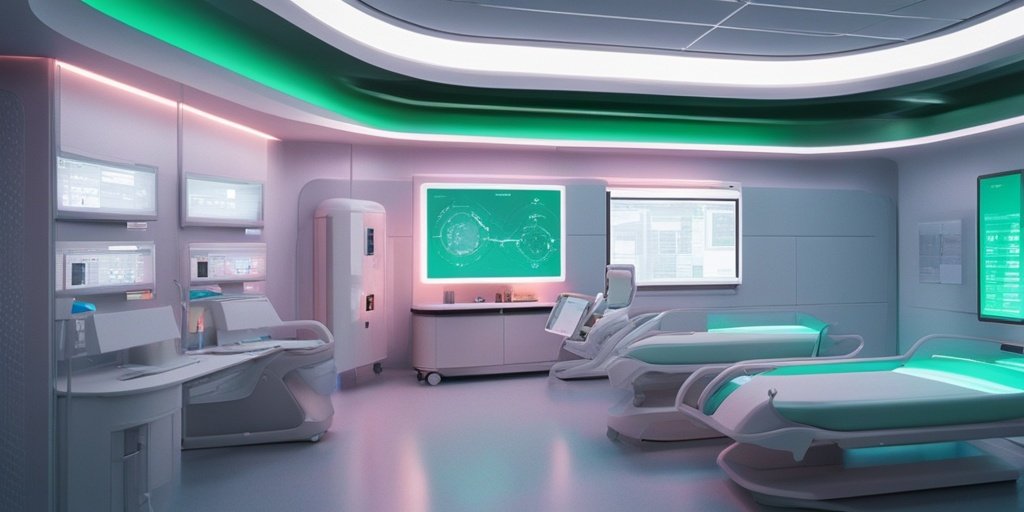⚡ Quick Summary
A recent study forecasts the evolution of smart hospitals over the next two decades, highlighting the transformative role of artificial intelligence (AI) and the shift towards individualized medicine and home care. The findings emphasize the urgent need to address staff shortages and enhance digital skills in healthcare.
🔍 Key Details
- 📊 Study Type: Real-time Delphi study
- 👥 Participants: 39 experts in healthcare, AI, and management
- 🗓️ Forecast Period: 2027 to 2042
- 🔑 Dimensions of Smart Hospitals: AI, sustainability, ecosystems, human-centeredness
🔑 Key Takeaways
- 📈 Shift to Individualized Medicine: Smart hospitals are expected to leverage AI for tailored patient care.
- 🏥 Staff Roles Evolving: Healthcare personnel will need to adapt to new technologies that enhance workflows.
- 🌱 Sustainability Practices: Integration of sustainability will be crucial in the development of smart hospitals.
- 👩⚕️ Staff Shortages: A predicted peak in staff shortages by 2032 poses a significant challenge.
- 🤖 AI Enhancements: AI advancements are anticipated to improve operational efficiency and patient engagement.
- 🌍 Collaborative Ecosystems: The future of healthcare will involve more collaborative approaches among various stakeholders.
- 📚 Need for Digital Skills: Robust digital skills are essential for healthcare practitioners to thrive in smart hospital environments.

📚 Background
The concept of smart hospitals is gaining traction as healthcare systems increasingly integrate digital technologies and artificial intelligence. However, the transition is fraught with challenges, including limited financial and human resources, insufficient digital skills, and the need for supportive policies. Understanding how these elements will evolve is crucial for shaping the future of healthcare delivery.
🗒️ Study
This study utilized an iterative mixed-methods approach, combining expert workshops and a real-time Delphi study to forecast the future of smart hospitals. The research aimed to conceptualize the immediate future of these hospitals across four dimensions: AI, sustainability, ecosystems, and human-centeredness, with a focus on the years leading up to 2042.
📈 Results
The findings reveal a significant shift towards individualized medicine and home care, facilitated by AI and digital technologies. Additionally, the study highlights the impending staff shortages that are expected to peak by 2032, necessitating a reevaluation of healthcare roles and responsibilities. The results suggest that healthcare personnel will need to embrace new technologies to improve patient engagement and operational efficiency.
🌍 Impact and Implications
The implications of this study are profound. As smart hospitals evolve, they will not only enhance patient-centric care but also integrate sustainability practices and foster collaborative ecosystems. However, addressing challenges such as staff shortages and ethical considerations will be essential to fully realize the potential of smart hospitals. The integration of AI and digital technologies promises to revolutionize healthcare delivery, making it more efficient and tailored to individual patient needs.
🔮 Conclusion
The vision of smart hospitals is gradually becoming a reality, with advancements in artificial intelligence poised to enhance operational efficiency and patient care. To achieve this vision, it is crucial to address the challenges of staff shortages and the need for robust digital skills. The future of healthcare looks promising, and ongoing research and collaboration will be key to navigating this transformative journey.
💬 Your comments
What are your thoughts on the future of smart hospitals and the role of AI in healthcare? We invite you to share your insights and engage in a discussion! 💬 Leave your comments below or connect with us on social media:
Forecasting the future of smart hospitals: findings from a real-time delphi study.
Abstract
BACKGROUND: In concert with other digital technologies, artificial intelligence (AI) is shaping the vision of smart hospitals. The transformation into smart hospitals, however, is all but trivial due to the lack of financial and human resources, digital skills, and supporting policies. Thus, the extent to which the vision of smart hospitals will eventually become reality is uncertain. In this context, our study provides a multidimensional conceptualization of the immediate future of smart hospitals to 2042.
METHODS: This study employs an iterative mixed-methods approach, including expert workshops and a Delphi study. We conducted a real-time Delphi study to forecast the evolution of smart hospitals in 5-year steps from 2027 to 2042. A total of 39 experts in healthcare, artificial intelligence, and management participated.
RESULTS: Our understanding of a technology-enabled smart hospital in this study includes four dimensions: artificial intelligence (AI), sustainability, ecosystems, and human-centeredness. Our findings underscore the critical need to address the shortage of hospital staff and general practitioners that models predict will peak by 2032. Additionally, our results show a significant shift to individualized medicine and home care. This shift indicates that smart hospitals are expected to leverage AI and digital technologies to tailor care to each patient. Furthermore, the roles and responsibilities of hospital staff will undergo significant changes. Healthcare personnel will have to adapt to new technologies that facilitate more efficient workflows and improve patient engagement in evolving healthcare environments. The results of our study suggest a shift in care to individualized medicine and home care, with corresponding changes in the roles and responsibilities of hospital staff who will employ new technologies.
CONCLUSIONS: The findings from our real-time Delphi study suggest that the vision of smart hospitals is gradually becoming reality over the next 20 years. Advancements in artificial intelligence should enhance operational efficiency and patient-centric care, while facilitating the integration of sustainability practices and fostering collaborative ecosystems. However, addressing challenges such as staff shortages, ethical considerations, and the need for robust digital skills will be essential. A deep pool of expert healthcare practitioners, clear ethical guidelines, and robust digital skills are essential to fully realize this vision and ensure that smart hospitals can meet the evolving needs of healthcare delivery.
Author: [‘Jovy-Klein F’, ‘Stead S’, ‘Salge TO’, ‘Sander J’, ‘Diehl A’, ‘Antons D’]
Journal: BMC Health Serv Res
Citation: Jovy-Klein F, et al. Forecasting the future of smart hospitals: findings from a real-time delphi study. Forecasting the future of smart hospitals: findings from a real-time delphi study. 2024; 24:1421. doi: 10.1186/s12913-024-11895-z